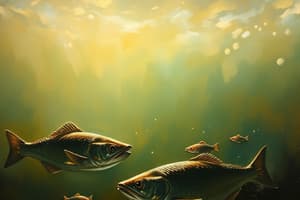Podcast
Questions and Answers
What event disrupted the ideal conditions for the Peruvian anchovy fishery in 1972?
What event disrupted the ideal conditions for the Peruvian anchovy fishery in 1972?
- Overfishing
- El Niño system (correct)
- Nutrient-rich water influx
- Hurricane
What was the main consequence of the environmental changes in 1972 for the anchovy fishery?
What was the main consequence of the environmental changes in 1972 for the anchovy fishery?
- Decline in juvenile anchovy populations (correct)
- Establishment of fishing regulations
- Recovery of fishery stocks
- Increased catch levels
What do density-independent factors generally include?
What do density-independent factors generally include?
- Climatic events and disturbances (correct)
- Nutritional availability
- Population density
- Predation and competition
What was the primary factor regulating the population of Thrips imaginis during the 1930s and 1940s?
What was the primary factor regulating the population of Thrips imaginis during the 1930s and 1940s?
What assumption must managers consider when using the logistic model to estimate the maximum sustainable yield?
What assumption must managers consider when using the logistic model to estimate the maximum sustainable yield?
What is a classic example of a density-independent effect on population regulation?
What is a classic example of a density-independent effect on population regulation?
How did the anchovy fishery manage to continue harvesting at the maximum sustainable yield despite environmental disruptions?
How did the anchovy fishery manage to continue harvesting at the maximum sustainable yield despite environmental disruptions?
Which of the following represents an intrinsic factor that can affect a population's growth?
Which of the following represents an intrinsic factor that can affect a population's growth?
What does maximum sustainable yield (MSY) refer to?
What does maximum sustainable yield (MSY) refer to?
At what population level does the highest production rate of biomass increase occur in a fish population growing logistically?
At what population level does the highest production rate of biomass increase occur in a fish population growing logistically?
What was one of the significant methods used by M. Graham to set fishing limits?
What was one of the significant methods used by M. Graham to set fishing limits?
What does the fishing quota need to achieve to maintain the maximum yield?
What does the fishing quota need to achieve to maintain the maximum yield?
How did fishery managers estimate the annual maximum sustainable yield for the anchovy population?
How did fishery managers estimate the annual maximum sustainable yield for the anchovy population?
What was the estimated MSY for the anchovy fishery?
What was the estimated MSY for the anchovy fishery?
What factors do fishery managers consider when setting limits for harvested biomass?
What factors do fishery managers consider when setting limits for harvested biomass?
What is a potential consequence of not allowing the fish population to recover after each harvest?
What is a potential consequence of not allowing the fish population to recover after each harvest?
Flashcards are hidden until you start studying
Study Notes
Maximum Sustainable Yield (MSY)
- MSY aims to maintain populations of fish, trees, and game at levels that prevent extinction while maximizing economic profit.
- Economic profit is achieved through maximum harvests, necessitating population recovery post-harvest.
- The relationship between biomass of new adults and adults remaining alive must balance losses from natural mortality and harvest.
Logistic Growth Model
- Developed by fishery biologist M. Graham in 1935 using North Atlantic trawler data.
- Highest biomass increase occurs at half the population's carrying capacity rather than at maximum density.
- Fishing quotas should maintain populations at this optimal point to ensure sustainable yield.
- The model has guided management decisions for various fish stocks, including the significant Peruvian anchovy fishery.
Peruvian Anchovy Case Study
- Managers estimated an MSY of approximately 10 million tons per year by analyzing multiple years of catch data.
- The model assumed logistic growth; however, the 1972 El Niño disrupted conditions, leading to an ecological and economic collapse.
- Overharvesting continued despite environmental changes, highlighting the need to account for fluctuations in carrying capacity.
Density-Independent Factors
- Unlike density-dependent factors, these variables impact populations regardless of their density.
- Major climatic events (e.g., hurricanes, floods) or disturbances (e.g., fires) can decimate population numbers uniformly.
- Thrips imaginis study illustrated that population declines were more influenced by environmental factors (like drought) rather than population density.
Regulatory Factors and Impacts
- As population density increases, regulatory factors become more pronounced, affecting growth rates and management strategies.
- Understanding the balance between density-dependent and density-independent factors is vital for effective species management.
- The case of cougars in North America underscores the impact of habitat destruction and overhunting on population distribution and survival.
Studying That Suits You
Use AI to generate personalized quizzes and flashcards to suit your learning preferences.




